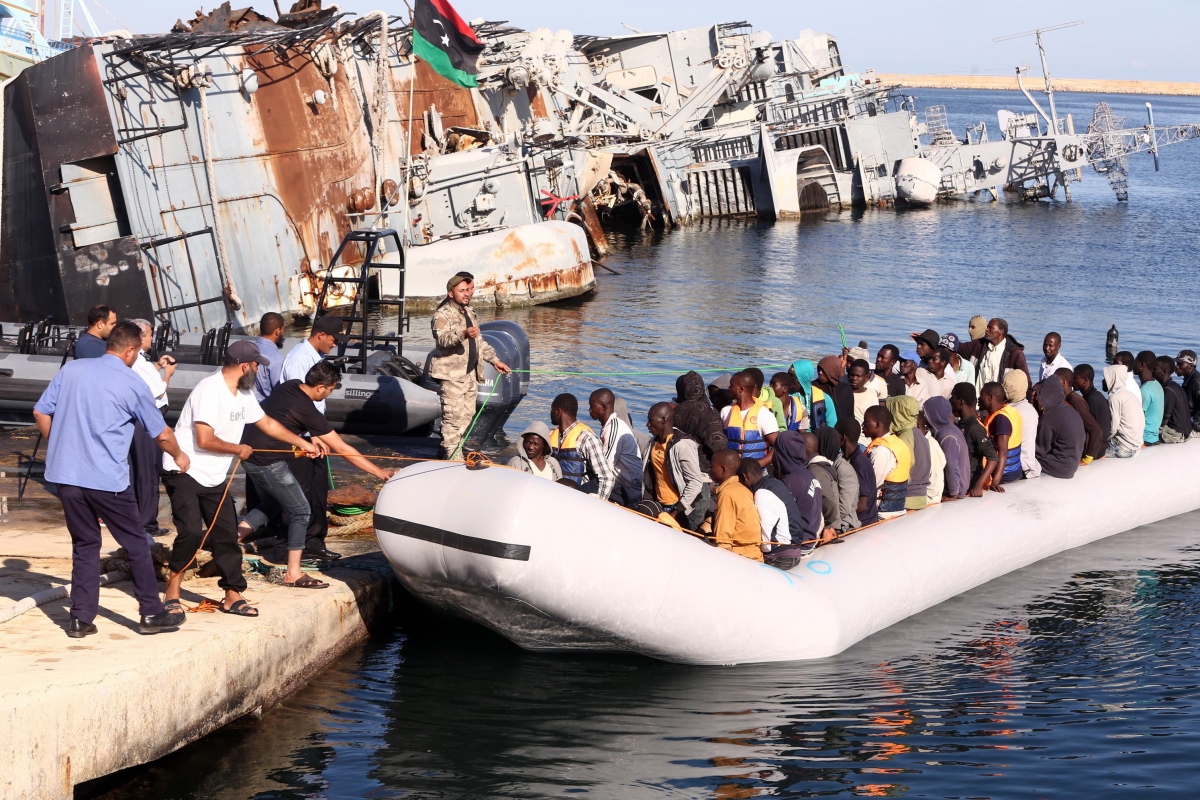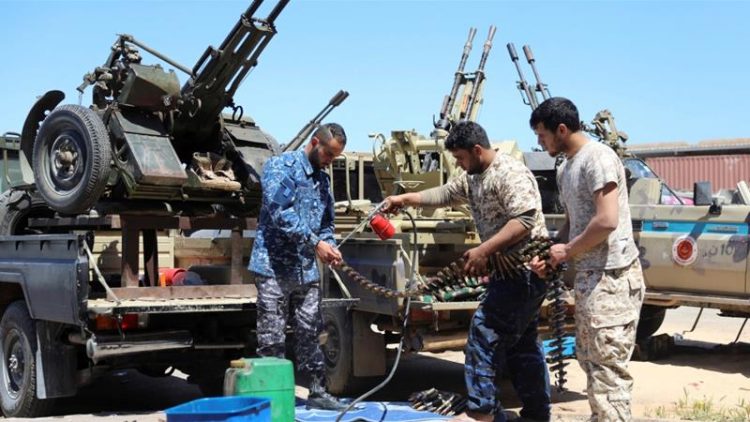www.aljazeerah.info
News, July 2019
Archives
Mission & Name
Conflict Terminology
Editorials
Gaza Holocaust
Gulf War
Isdood
Islam
News
News Photos
Opinion Editorials
US Foreign Policy (Dr. El-Najjar's Articles)
www.aljazeerah.info
|
Editorial Note: The following news reports are summaries from original sources. They may also include corrections of Arabic names and political terminology. Comments are in parentheses. |
France Plays Two-Faced Game in Libya, No Ceasefire in the Making After a Hundred Days of Fighting in Tripoli
July 14, 2019
 |
 |
| Libyan Coast Guard rescues 53 illegal immigrants off Sabratha coast, July 14, 2019 | Libyan fighters in Tripoli, file, July 14, 2019 |
Benghazi funeral car bomb kills 4, injures 33
By Sami Zaptia, Libya Herald.
London, 11 July 2019:
At least three car explosions in Benghazi’s Al-Hawari cemetery during a funeral today killed 4 and injured 33. This included civilians attending the burial ceremony.
The funeral was of former Saiqa Special Forces Commander, Khalifa Al-Mesmari, and was attended by a high concentration of military personnel.
Mesmari had died in Jordan two days ago after having suffered a chronic illness.
Some reports suggested that the explosion was targeting the Libyan National Army’s (LNA) Wanis Boukhamada, the current Commander of the Saiqa Special Forces. The LNA has said Boukhamada was unhurt.
LNA Commander, Khalifa Hafer, has ordered an immediate investigation by all security forces in the “terrorist bombings”.
LNA Official Spokesperson Ahmed Mesmari told eastern-based media that the terror attack was carried out by “paid traitors”.
Libyan Air Force targets operations room of Haftar's forces south of Tripoli
July 14, 2019 - By Libyan Express,
By: SafaAlharathy
The Volcano of Rage Operation confirmed that the Libyan Air Force has targeted the operations room of Haftar's forces in Wadi Al-Rabi area south of the capital.
"The airstrikes also targeted armed vehicles belonging to Haftar's militias south of Mizdah town in Mount Nafusa, which was on its way to Gharyan city, in what appears an attempt to recapture the city after its liberation last June," the Information Office of the Volcano of Rage Operation stated on Sunday.
At another level, sources confirmed the killing of the notorious leader in Haftar's forces, Mohammed Ashtawi, known as "Al-Kubba" after a dispute between him and the so-called Tariq Ibn Ziad battalion of Haftar, over the distribution of ammunition.
The sources also confirmed the killing of Hassan Qatnash, a well-known fuel smuggler and human trafficker in Bani Walid city, who had joined Haftar's militias in their war on Tripoli since the beginning.
Qatnash died of his wounds following a dispute with Tariq Ibn Ziyad battalion.
Ashtawi and Qatnash are leaders in the pro-Gaddafi regime militia, which is now fighting alongside Haftar's forces.
With these deaths, the number of leaders assassinated from the former regime, who are fighting with Haftar, has reached three, after the killing of Colonel Massoud Al-Dhawi last May.
A hundred days of fighting in Tripoli; no ceasefire in the making
By Libyan Express,
Published 13 Jul 2019Fighters getting ready for Tripoli battle. [Photo: Internet] Tripoli’s battle has passed it’s 100th day with a striking death toll of over 1050 killed, 5500 injured and over 100.000 displaced.
The battle that was kicked off by Khalifa Haftar and his forces from eastern Libya on April 04 continues on the outskirts of the capital with no advances or signs of possible entry to Tripoli as forces allied with the Government of National Accord keep pushing them out and away from the capital.
During the last 100 days, Haftar has lost many of his forces’ positions in southern Tripoli and has lost his main supplies line and operations room city – Gharyan.
On the political level, the international community and regional players have called more than once for a ceasefire, but the GNA has it’s own conditions for that, including the return of Haftar’s forces to their previous positions, which Haftar refuses.
Meanwhile, the impact of the battle is still high as water, power and fuel shortages continue to persist.
France’s two-faced game in Libya
July 14, 2019 - 23:18
France is claiming it recognizes Tripoli-based Presidential Council as the legitimate government of Libya, but on the other hand, it backs warlord Khalifa Haftar under the table to topple the UN-recognized Presidential Council, a step described by observers as a play of the two-faced game in the North African country.
Early in April, armed groups of warlord Khalifa Haftar seized the mountain city of Gharyan without a gunshot after the city’s militia leader Adel Da’ab decided to join them.
Haftar’s armed groups, with the help of French and Emirati military experts, set up a military operation room in Gharyan to conquer Tripoli. Shortly after Gharyan seizure, a group of 13 French armed intelligence officers were intercepted by Tunisian authorities at the border with Libya. Tunisian media reports suggested that the French officers may have assisted Haftar’s forces to set up the operation room.
But things didn’t work out as they planned. On July 26, government forces retook Gharyan after over three months of seizure, in a big blow to warlord Haftar and his foreign allies.
Presidential Council forces took control of the city in a surprise 7-hour attack and arrested over a hundred local fighters and foreign mercenaries. They also seized the operation room set up by Haftar and his foreign allies, in addition to a number of futuristic weapons, including US-made Javelin missiles.
While accusations for the fire-and-forget missile supply were directed at the UAE, one of the key backers, US officials concluded that the missiles were first sold to France before ending up in the hands of warlord Haftar’s armed groups.
Feeling embarrassed, France admitted that the Javelin missiles found in Gharyan were purchased from the United States, but it claimed that “the missiles were never intended for sale or transfer to any party to the Libya conflict.”
In a statement, it added that the missiles were “damaged and unusable” and were intended for the “self-protection of a French military unit deployed to carry out counter-terrorism operations”.
France’s narrative was deemed inaccurate and full of contradictions by many observers and politicians.
Presidential Council member, Mohammad Amari Zayed said France’s statement on the presence of its missiles in Gharyan is contradictory. From one side the statement claimed the missiles were “damaged and unusable” but on the other side, it claimed the missiles were for self-protection and fighting terrorism.
So how can one fight terrorism with damaged and unusable weapons? Amari argues.
Anas El Gomati, Director of Libyan think tank Sadeq Institute said France’s presence in Gharyan proves that it knew about Haftar’s offensive on Tripoli and supported it despite its claims of support to Tripoli-based Presidential Council. El Gomati said France was lying about its weapons supply to Haftar to topple the Presidential Council.
Ahmed Sewehli, a Libyan democracy advocate, thinks France is at war with Libya, accusing it of mass murdering Libyan people with their sophisticated weapons supply to Haftar.
France’s support to Haftar goes back to 2014 during his war on Benghazi. A French military operation room was set up to help Haftar’s forces take control of the city on the pretext of fighting terrorism.
In July 2016, three French special forces soldiers were killed when their helicopter was shot down in El Magrun town, about 75 km south of Benghazi, during a military operation to Back Haftar’s forces. Benghazi Defence Brigades claimed responsibility for the shoot-down, but France claimed the helicopter crash was accidental.
France’s link to the fight against ISIS has raised eyebrows. During Al-Bonyan Al-Marsous war on ISIS in Sirte in 2016, a French submarine approached the coast in an attempt to evacuate “important persons” as the war on the terror group was raging.
Speaking to The Libya Observer on condition of anonymity, a high-profile state security officer revealed that Libyan Navy forces had detected a submarine sailing near the coast and sent a request for the call sign. The crew of the submarine identified themselves as US marine forces conducting some operations before vanishing. Later US Africa Command denied the presence of any US submarines near the coast at the time after a request for clarification sent by the Presidential Council.
The Libyan Navy concluded that the submarine belonged to the French Navy and it was attempting to help some “important persons” flee from Sirte, according to the state security officer.
Some reports claimed that France was trying to evacuate some ISIS leaders who were working for French intelligence.
https://www.libyaobserver.ly/news/france’s-two-faced-game-libya
***
Share the link of this article with your facebook friendsFair Use Notice
This site contains copyrighted material the
use of which has not always been specifically authorized by the copyright
owner. We are making such material available in our efforts to advance
understanding of environmental, political, human rights, economic,
democracy, scientific, and social justice issues, etc. We believe this
constitutes a 'fair use' of any such copyrighted material as provided for
in section 107 of the US Copyright Law. In accordance with Title 17 U.S.C.
Section 107, the material on this site is
distributed without profit to those
who have expressed a prior interest in receiving the included information
for research and educational purposes. For more information go to: http://www.law.cornell.edu/uscode/17/107.shtml.
If you wish to use copyrighted material from this site for purposes of
your own that go beyond 'fair use', you must obtain permission from the
copyright owner.
|
|
|
|
||
|
||||||


